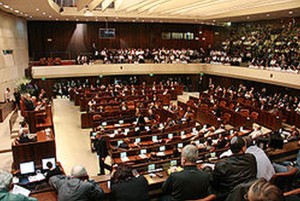“Each us of knows the other must give in if we are to make any progress for the public good.”
 Jerusalem, August 8 – Parties hoping to gain positions in any anticipated coalition to emerge from next month’s parliamentary elections reached accord on one of the chief issues facing any such development: that those whose demands contradict theirs should demonstrate flexibility for the sake of coalition stability and integrity.
Jerusalem, August 8 – Parties hoping to gain positions in any anticipated coalition to emerge from next month’s parliamentary elections reached accord on one of the chief issues facing any such development: that those whose demands contradict theirs should demonstrate flexibility for the sake of coalition stability and integrity.
Prominent members of parties whose requirements for membership in a coalition conflict with those of other parties competing for reelection agreed today that the other ones should compromise on those demands, lest negotiations to form a coalition break down once again and the country face a third round of elections and face a constitutional crisis.
Yisrael Beiteinu chief Avigdor Liberman told reporters that despite their fundamental differences with Haredi parties on such contentious issues as the universal military draft, his group and the Haredim see eye to eye on the need for the other to bend. “We have vastly different assumptions governing our worldviews,” he acknowledged in a telephone interview Thursday, “but that does not prevent us from knowing there are certain points where our positions overlap, where we might even come together. In this case, each us of knows the other must give in if we are to make any progress for the public good.”
United Torah Judaism leader Yaakov Litzman, currently the Deputy Minister of Health, concurred. “To the casual observer we and Yisrael Beiteinu – or Blue and White, for that matter – have so little in common that the thought of us finding any shared elements in our respective Weltanschauungs would be ridiculous,” he observed. “Still, on one crucial point there isn’t the slightest daylight between us: we insist they compromise on the points that for us are non-negotiable, and vice versa.”
Even parties that have declared they would not sit together in any possible coalition agreed on this point. “Things would have to change drastically for us to be able to share positions in a government with the religious parties,” conceded Meretz chairwoman Tamar Zandberg. “Obviously that’s a hypothetical scenario, given all the poll numbers that foresee a right-wing majority getting elected, but still, should that shift the other way in the next six weeks, we can definitely see ourselves dovetailing with UTJ and even Shas on this. Even though we hold polar-opposite positions on such questions as the role of religion in public life and the extent to which the government should accommodate religion, if at all. It’s one of those rare instances of unity in a fractured polity, and we should savor it.”
Please support our work through Patreon.




